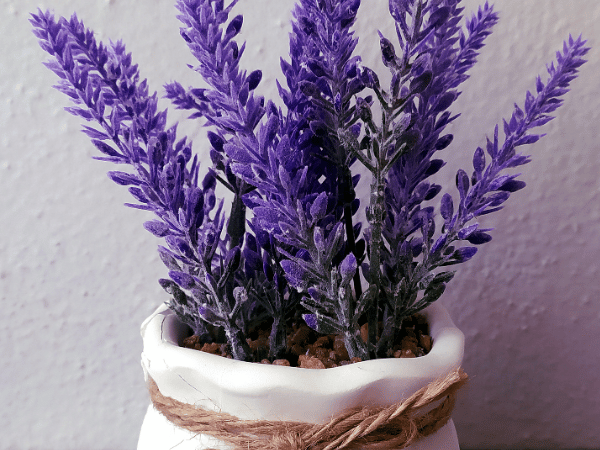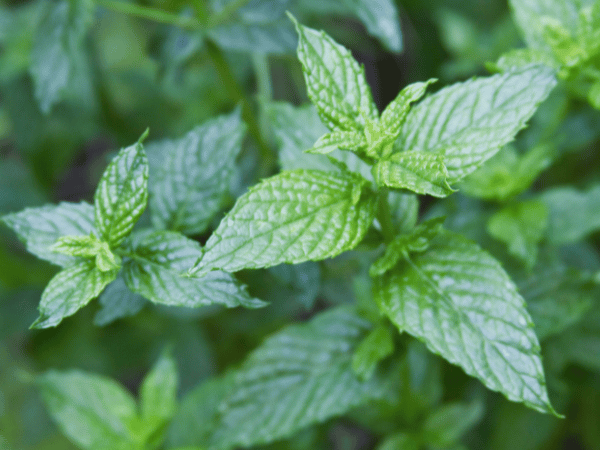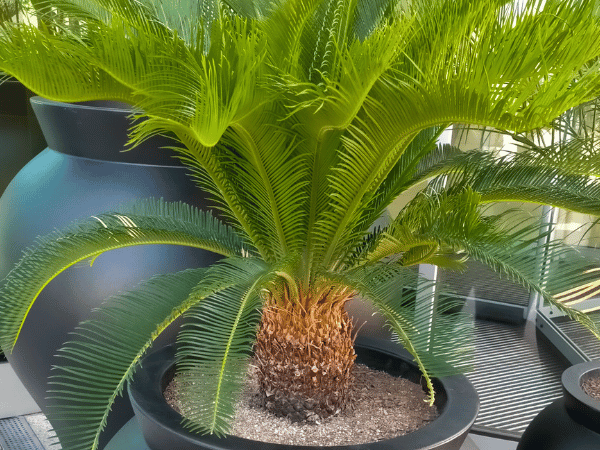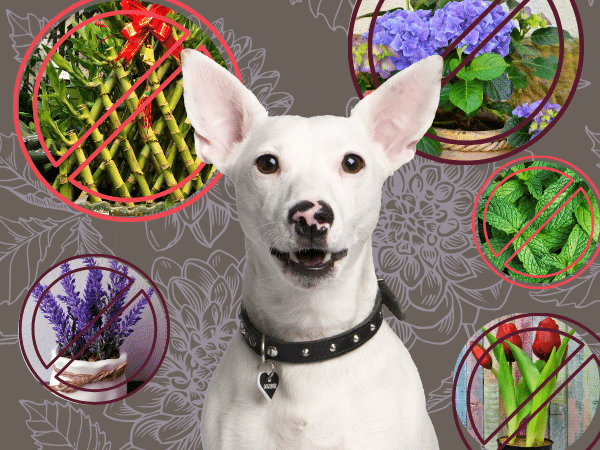Do you have a pup that can’t resist exploring plants? It’s important to be aware of toxic plants for dogs that can be harmful if ingested. Some common examples include lavender plants, citronella, snake plants, lucky bamboo, hydrangeas, and certain poisonous palm plants for dogs. These plants can cause symptoms like nausea and vomiting.
In this vet-approved guide from Sploot Veterinary Care, we will explore the most prevalent toxic plants for dogs and shed light on the harmful symptoms they can produce.
What’s in This Guide?
- What Plants are Toxic to Dogs?
-
- Is the Lavender Plant Safe for Dogs?
-
- Are Citronella Plants Safe for Dogs?
-
- Are Snake Plants Safe for Dogs?
-
- Is the Aloe Vera Plant Safe for Dogs?
-
- Is Mint Plant Safe for Dogs?
-
- Is the Eucalyptus Plant Safe For Dogs?
-
- Is Lucky Bamboo Safe for Dogs?
-
- Are Tulips Safe for Dogs?
-
- Are Hydrangeas Safe for Dogs?
-
- Are There Poisonous ‘Palm’ Plants for Dogs?
- Final Thoughts on Toxic Plants for Dogs
What Plants Are Toxic to Dogs?
For households with dogs, it’s crucial to be mindful of certain toxic plants for dogs that may pose risks to their health and well-being. These plants can cause symptoms like diarrhea and vomiting. To ensure the utmost safety for your canine companion, it’s advisable to either avoid these plants altogether or keep them well out of reach.
Note: If you notice any symptoms of toxin ingestion, we recommend contacting an urgent care veterinarian.
1. Is the Lavender Plant Safe for Dogs?
- Scientific name: Lavendula angustifolia
- Toxic Plant for Dogs: Yes – toxic to dogs
Lavender plants, commonly referred to as English Lavender or Common Lavender, are celebrated for their soothing scent and stunning purple blossoms. However, it’s important to note that these plants may pose a risk to canine companions.
If ingested, lavender plants can cause uncomfortable toxicity symptoms for dogs, such as nausea and gastrointestinal issues.

2. Are Citronella Plants Safe for Dogs?
- Scientific name: Cymbopogon nardus
- Toxic Plant for Dogs: Yes – toxic to dogs
Citronella plants, also called citronella grass, emit a fresh citrus fragrance and serve as a natural insect repellent. However, they can be toxic to dogs, so households with canine companions should exercise caution with this plant.
If ingested, citronella plants can cause vomiting and diarrhea in dogs.
3. Are Snake Plants Safe for Dogs?
- Scientific name: Dracaena trifasciata (aka Sansevieria trifasciata)
- Toxic Plant for Dogs: Yes – toxic to dogs
Snake plants add contemporary elegance to any room with their striking upright leaves. However, visually captivating as they are, snake plants can be harmful to dogs if ingested, making them a less suitable choice for pet-friendly households.
If ingested by dogs, snake plants can cause symptoms like diarrhea, nausea, excessive salivation, and dilated pupils.
4. Is the Aloe Vera Plant Safe for Dogs?
- Scientific name: Aloe vera
- Toxic Plant for Dogs: Yes – toxic to dogs
Aloe vera plants are cherished for their soothing gel and medicinal properties. However, pet owners should be aware that aloe vera can be toxic to dogs, so careful placement is necessary in homes with canine residents.
If ingested, aloe vera may cause symptoms like diarrhea and vomiting in dogs.
5. Is Mint Plant Safe for Dogs?
- Scientific name: Mentha spp.
- Toxic Plant for Dogs: Yes – toxic to dogs
Mint plants, belonging to the Mentha genus, have a refreshing flavor and aroma, perfect for culinary use and herbal remedies. However, it’s important to note that mint plants can be toxic to dogs, so pet owners need to keep them out of reach or opt for other dog-friendly plants.
If ingested by pups, mint can cause vomiting and diarrhea.

6. Is the Eucalyptus Plant Safe For Dogs?
- Scientific name: Eucalyptus spp.
- Toxic Plant for Dogs: Yes – toxic to dogs
Eucalyptus plants are renowned for their aromatic leaves and therapeutic benefits. However, they should be kept away from dogs as they can be toxic if ingested. Eucalyptus ingestion can cause symptoms like excessive salivation, vomiting, diarrhea, and lethargy.
Similarly, eucalyptol oil should be kept away from canines as it can cause liver and kidney damage.
7. Is Lucky Bamboo Safe for Dogs?
- Scientific name: Dracaena sanderiana
- Toxic Plant for Dogs: Yes – toxic to dogs
Lucky bamboo, symbolizing prosperity and good fortune, adds a touch of serenity to indoor environments. However, pet owners should be vigilant as lucky bamboo can be harmful to dogs if chewed on. Unlike ‘true’ bamboo, lucky bamboo belongs to the Dracaena genus and is not really a bamboo plant.
Lucky bamboo, as well as other dracaenas, are toxic plants for dogs, causing symptoms like excessive salivation, vomiting blood, and depression.
8. Are Tulips Safe for Dogs?
- Scientific name: Tulipa spp.
- Toxic Plant for Dogs: Yes – toxic to dogs
Tulips, with their vibrant hues and graceful blooms, are cherished symbols of spring’s arrival. However, these flowers contain toxins that can be harmful to dogs if ingested, causing symptoms like excessive salivation, vomiting, and diarrhea.

9. Are Hydrangeas Safe for Dogs?
- Scientific name: Hydrangea arborescens
- Toxic Plant for Dogs: Yes – toxic to dogs
Hydrangeas, with their lush clusters of flowers in varying shades, add elegance to gardens and bouquets. Despite their beauty, hydrangeas contain toxins that may pose a risk to dogs. If ingested, this plant can cause symptoms like diarrhea, vomiting, and depression.
10. Are There Poisonous ‘Palm’ Plants for Dogs?
While certain ‘true’ palm plants, such as the parlor palm and areca palm, are safe for dogs, other plants that are NOT ‘true’ palms can be toxic to dogs. These palm-like plants may look like palm plants or have “palm” in their names but are not considered palm plants from a botanical perspective. Here are some species to watch out for:
a. Dracaena (Dracaena spp)
Certain plants in the Dracaenas genus have a palm-like appearance and can be stylish house plants. However, similar to other palm-like plants mentioned in this article, dracaenas are toxic to dogs. If ingested, dracaena plants can cause depression and bloody vomiting.
b. Yuccas (Yucca spp.)
Yucca plants are yet another type of palm-like plant used to adorn indoor and outdoor spaces. However, just like the other palm-like plants in this article, yucca plants can be hazardous for pets. Yucca plants are toxic to dogs, potentially causing vomiting if ingested.
c. Sago Palm (Cycas revoluta)
A sago ‘palm’, which is not a true palm, shares a resemblance with true palm plants and evokes a similar tropical serenity. However, for dog parents, it’s crucial to recognize and possibly avoid this plant species as it can be highly toxic to dogs.
When ingested, sago palm can cause vomiting, jaundice, bloody stool, and possible liver damage. Ingestion of the plant can also be fatal in the absence of prompt medical treatment.

Final Thoughts on Toxic Plants for Dogs
In conclusion, we strongly encourage dog owners to thoroughly vet the safety of plants before bringing them home. Apart from the comprehensive articles provided by Sploot Veterinary Care, the extensive databases of the ASPCA and Pet Poison Helpline are excellent resources for assessing the toxicity or safety of various plants.
Lastly, it’s essential to remain vigilant for signs of potential plant toxicity in dogs, such as vomiting, diarrhea, lethargy, and more.
Note: If you suspect your dog has ingested a toxin, don’t hesitate to contact appropriate helplines like the Pet Poison Helpline or ASPCA Animal Poison Control Center for immediate assistance over the phone. In cases of extended wait times, seek guidance from an urgent care veterinarian or emergency vet for prompt assistance.
Sploot Veterinary Care: Urgent Care for Dogs
At Sploot Veterinary Care, we offer comprehensive primary and urgent care veterinary services for dogs, all under one roof. Whether your furry friend requires a routine wellness exam, a check-up, or pet urgent care, our team is here to provide top-notch care.
Our veterinary clinics are open 365 days a year, with extended hours until 10 pm. We happily accommodate same-day appointments and urgent intakes. Book an appointment online or through the Sploot Vets app. As for urgent concerns, feel free to reach out to our team directly.
Till next time, we’re with you every pounce of the way!
